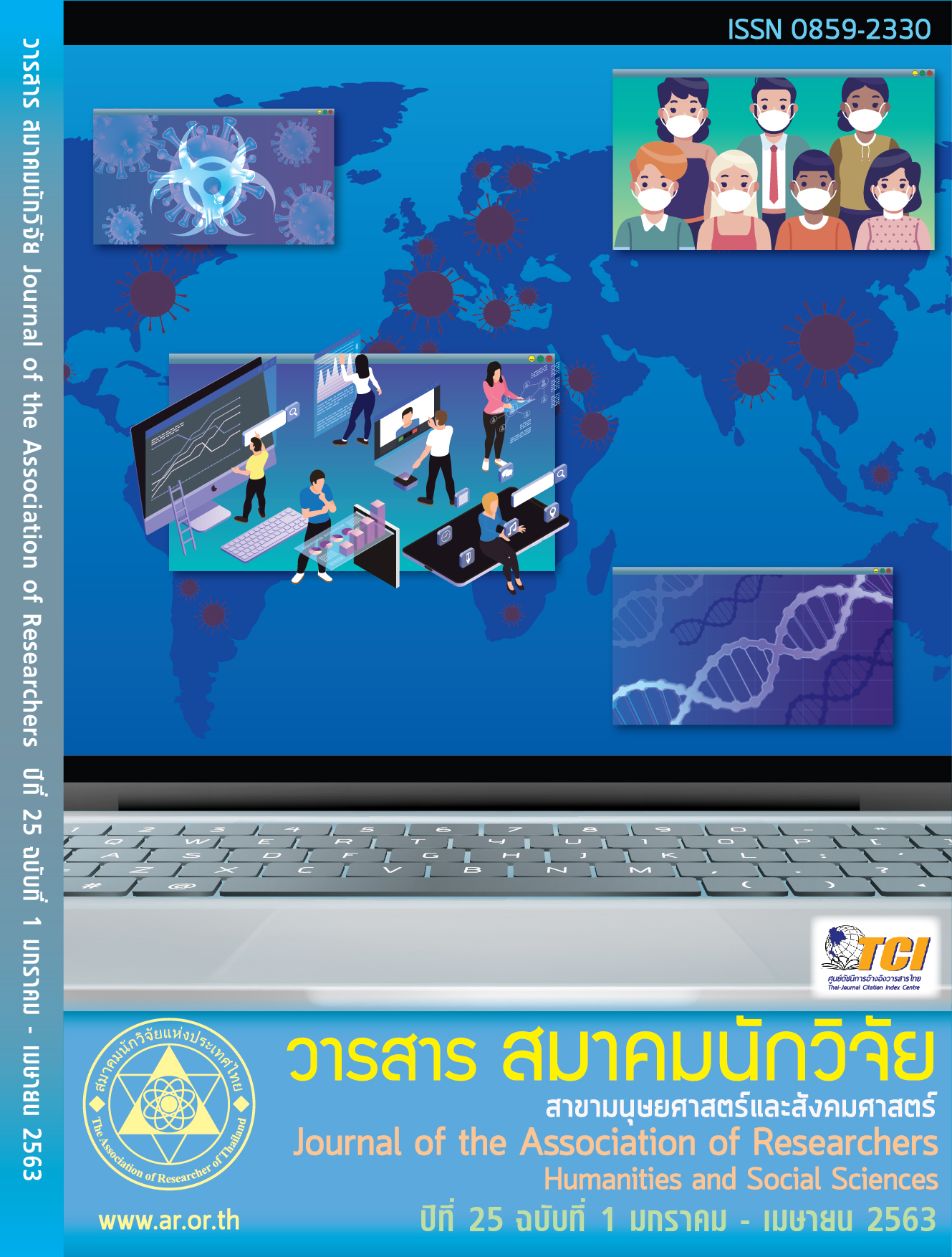The Development of Management Models of Primary School Network under the Office of the Basic Education Commission
Main Article Content
Abstract
The purposes of this research were 1. to analyze the elements of management models of Primary School Network under the Office of the Basic Education Commission. 2. To create the management models of Primary School Network under the Office of the Basic Education Commission, and 3. to evaluate the management models of Primary School Network under the Office of the Basic Education Commission. The research was conducted with 3 steps as follow; Step 1 Analyze the elements of management models of Primary School Network under the Office of the Basic Education Commission by using documents and interviewing 7 experts. The research data was collected 606 samples from 303 schools. The research instruments were interviewing and questionnaire with validity at 0.97. The statistics used were content analysis, frequency, percentage, standard deviation and exploratory factor analysis. Step 2 Create the management models of Primary School Network under the Office of the Basic Education Commission by examining the models using the expert-based seminar with 11 experts. The research instruments were a draft of the management models of Primary School Network under the Office of the Basic Education Commission and document for expert-based seminar. The statistic was content analysis. Step 3 Evaluate the management models of Primary School Network under the Office of the Basic Education Commission by collecting the data from 9 directors of the Primary Schools under the Office of the Basic Education Commission. The instruments were the models evaluation form and the manual for the management models of Primary School Network under the Office of the Basic Education Commission. The statistics were mean and standard deviation. The research found that 1. The 5 elements of the management models of Primary School Network under the Office of the Basic Education Commission are (1) group activity (2) quality improvement (3) using technology (4) members participation and (5) strategy development. 2. The management models of Primary School Network under the Office of the Basic Education Commission consists of 3 parts; (1) introduction comprises with concepts, principles and models objectives, (2) content and operation guidelines, and (3) conditions for success. 3. The evaluation results of the manual for the management models of Primary School Network under the Office of the Basic Education Commission are accuracy, adequacy, possibility and usefulness, all in high level
Article Details
บทความที่ปรากฏในวารสารนี้ เป็นความรับผิดชอบของผู้เขียน ซึ่งสมาคมนักวิจัยไม่จำเป็นต้องเห็นด้วยเสมอไป การนำเสนอผลงานวิจัยและบทความในวารสารนี้ไปเผยแพร่สามารถกระทำได้ โดยระบุแหล่งอ้างอิงจาก "วารสารสมาคมนักวิจัย"
References
กระทรวงศึกษาธิการ. (2550). พระราชบัญญัติการศึกษาแห่งชาติ พ.ศ. 2542 และแก้ไขเพิ่มเติม (ฉบับที่ 2) พ.ศ. 2545 และ(ฉบับที่ 3) พ.ศ. 2553 พร้อมกฎหมายที่เกี่ยวข้องและพระราชบัญญัติการศึกษาภาค บังคับ พ.ศ. 2545. กรุงเทพฯ : โรงพิมพ์องค์การรับส่งสินค้าพัสดุภัณฑ์.
จิรภัทร มหาวงค์ วิทยา จันทร์ศิลา และทำรงลักษณ์ เอื้อนครินทร์. การพัฒนารูปแบบการบริหารเครือข่าย ความร่วมมือทางวิชาการของโรงเรียนในถิ่นทุรกันดารบนเขตพื้นที่สูง.วารสารศึกษาศาสตร์ มหาวิทยาลัยนเรศวร, 18(4), 114-127.
จำนงค์ แจ่มจันทรวงษ์. (2553). การพัฒนารูปแบบการบริหารระบบเครือข่ายเพื่อส่งเสริมคุณภาพใน สถานศึกษาขั้นพื้นฐาน สังกัดสำนักงานเขตกรุงเทพฯ. วิทยานิพนธ์ครุศาสตรดุษฎีบัณฑิต การบริหารการศึกษา ภาควิชานโยบายการจัดการและความเป็นผู้นำ จุฬาลงกรณ์มหาวิทยาลัย.
ธนวิชญ์ แก่นท้าว. (2560). การบริหารแบบมุ่งผลสัมฤทธิ์ที่มีประสิทธิผลของโรงเรียนขนาดเล็กในภาคตะวันออกเฉียงเหนือตอนบน. วารสารวิชาการสถาบันวิทยาการจัดการแห่งแปซิฟิค, 3(2), 89–100.
ประยูร อัครบวร. (2553). การสร้างเครือข่ายและการมีส่วนร่วม (Network building and participatory). กรุงเทพฯ: โรงพิมพ์แห่งจุฬาลงกรณ์มหาวิทยาลัย.
พิสิฐ เทพไกรวัล. (2554). การพัฒนารูปแบบเครือข่ายความร่วมมือเพื่อคุณภาพการจัดการศึกษาในโรงเรียนประถมศึกษาขนาดเล็ก. วิทยานิพนธ์ปรัชญาดุษฎีบัณฑิต การบริหารการศึกษา มหาวิทยาลัยขอนแก่น.
ราชกิจจานุเบกษา. (2560). รัฐธรรมนูญแห่งราชอาณาจักรไทย พุทธศักราช 2560. กรุงเทพฯ: สํานักพิมพ์คณะรัฐมนตรีและราชกิจจานุเบกษา.
วาโร เพ็งสวัสดิ์. (2553). การวิจัยพัฒนารูปแบบ. วารสารมหาวิทยาลัยราชภัฎสกลนคร, 2(4), 1-15.
ศิริพร ตันติยมาศ. (2550). รูปแบบการบริหารเครือข่ายโรงเรียนแบบมีส่วนร่วมที่มีประสิทธิผล สังกัด กรุงเทพฯ. ปรัชญาดุษฎีบัณฑิต การบริหารการศึกษา บัณฑิตวิทยาลัย มหาวิทยาลัยศิลปากร.
สํานักงานคณะกรรมการการศึกษาขั้นพื้นฐาน. (2550). แนวทางการกระจายอำนาจการบริหารและการจัดการศึกษาให้คณะกรรมการ: สำนักงานเขตพื้นที่การศึกษาและสถานศึกษาตามกฎกระทรวงกำหนดหลักเกณฑ์และวิธีการกระจายอำนาจการบริหารและการจัดการศึกษา พ.ศ. 2550. กรุงเทพฯ: ชุมนุมสหกรณ์การเกษตรแห่งประเทศไทย.
สมศักดิ์ เอี่ยมดี มานิตย์ ไชยกิจ กาญจนา เงารังสี และสุมาลี จันทร์ชลอ. (2556). การพัฒนาระบบการบริหารเครือข่ายการมีส่วนร่วมในการจัดการศึกษาของสำนักงานเขตพื้นที่การศึกษาประถมศึกษา. วารสาร ศึกษาศาสตร์ มหาวิทยาลัยนเรศวร, 15(ฉบับพิเศษ), 216-224.
Keeves, J.P. (1988). Educational Research Methodology and Measurement. Oxford, UK: Pergamon Press.
Riley, K. (1997). Changes in Local Governance –Collaboration through Networks : A post-16 Case study. Educational Management and Administration, 25(2), 155-167.
Translated Thai Reference
Aiumdee, S., Chaiyagij, M., Ngrorangsri, K. & Chantal, S. (2013).The Development of the Participative Education Networks System under the Management of Primary Educational Service Area Offices. Journal of Education Naresuan University, 15 (Special Issue), 216-224. (In Thai)
Akarabuaworn, P. (2010). Network Building and Participatory. Bangkok: Chulalongkorn University Printing House. (In Thai)
Jamjanwong, J. (2010). Administrative Network Model for Promoting Academic Quality of Basic Schools under Bangkok Metropolitan Administration. A Dissertation for the Degree of Doctor Education in Educational Administration, Chulalongkorn University. (In Thai)
Keanthow, T. (2017). Results based Management regarding on Effectiveness of Small-sized Schools in Upper Part of Northeast Region of Thailand. Journal of Pacific Institute of Management Science, 3(2), 89 – 100. (In Thai)
Mahawong, C., Jansila, V. & U-nakarin, T. (2016). Administrative Network Model for Academic Collaboration of Schools in Remote Hilander Areas. Journal of Education Naresuan University, 18(4), 114-127. (In Thai)
Ministry of Education. (2004). New Educational Reform. Bangkok: Cargo Delivery Organization Printing House. (In Thai)
Ministry of Education. (2007). National Education Act B.E. 2542 as amended by Act (No.2, 2545) and (No.3, 2553) Including Compulsory Education Act B.E. 2545. Bangkok: Cargo Delivery Organization Printing House. (In Thai)
Office of the Basic Education. (2007). The Guides of Decentralization and Educational Administration for Commissions. Bangkok: The Agricultural Cooperative Federation of Thailand, Limited. (In Thai)
Peangsawad, W. (2010). Developing Model Research. Rajabhat Sakon Nakhon University Journal, 2(4), 1-15. (In Thai)
Royal Thai Government Gazette. (2017). The Constitution of the Kingdom of Thailand (B.E. 2560). Bangkok: Cabinet and Royal Gazette Publishing Office. (In Thai)
Tantiyamas, S. (2007). The Model of participative Management in Effective School luster under Bangkok Metropolitan Administration. A Dissertation for the Doctor of Philosophy Degree, Department of Educational Administration, Graduate School, Silpakorn University. (In Thai)
Thepkraiwun, P. (2011). The Development of a Collaborative network Model for Educational Quality Management in Small Sized Primary Schools. A Dissertation for the Doctor of Philosophy Degree in Educational Administration, Graduate School, Khon Kean University. (In Thai)


